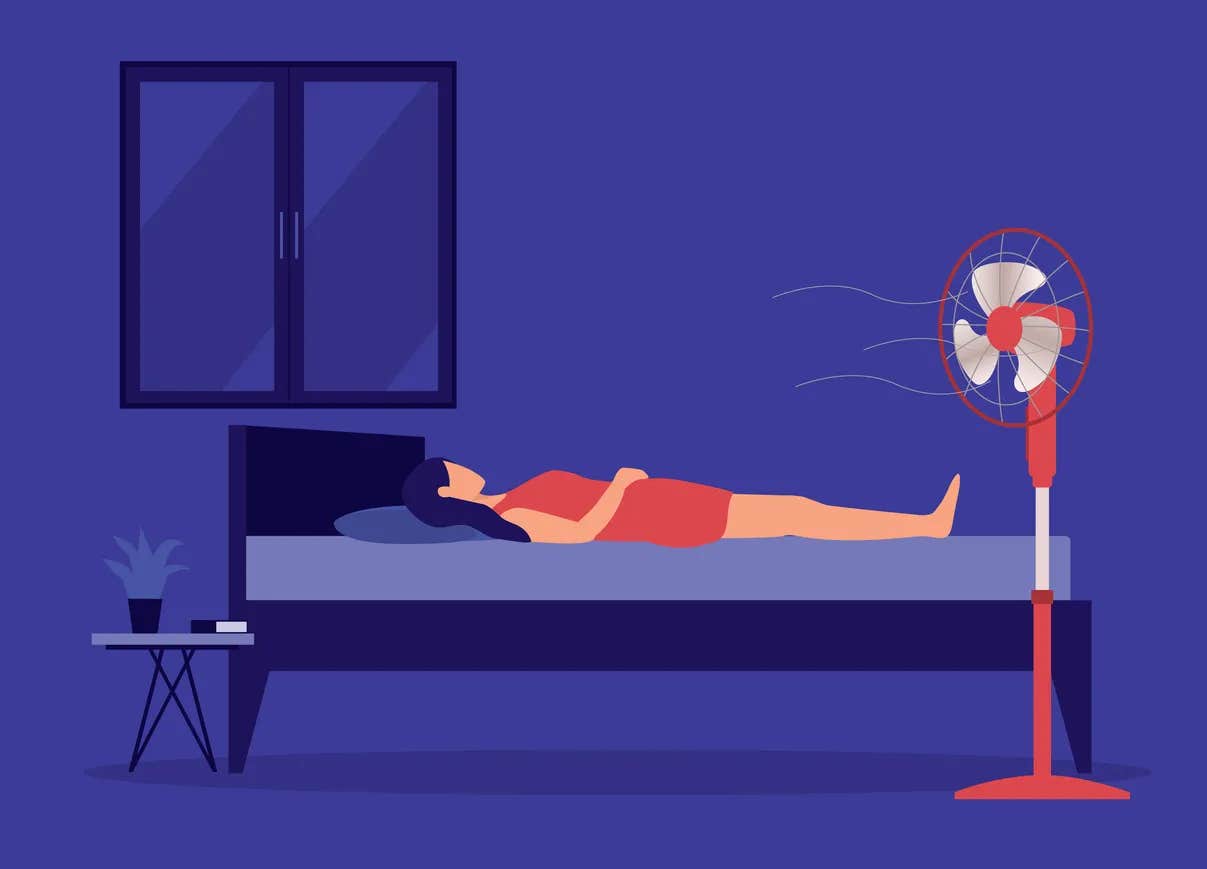
The Daily Habits That Can Help Ease Menopause Symptoms
By Lindsay Morris,
Last Updated:- A low-fat, whole-food, plant-based diet with a daily serving of soybeans may cut moderate-to-severe hot flashes by up to 88%.
- Plant-based diets support healthy weight, better insulin sensitivity, and lower risk of heart disease around menopause.
- Limiting saturated fat, added sugar, and ultraprocessed foods appear to help reduce hot flash frequency and improve sleep.
- Lifestyle strategies can serve as a first-line approach, with medical treatments available for more severe symptoms.
October is Menopause Awareness Month, a time to clear up confusion about a natural stage in a woman’s reproductive health. About 85% of women experience menopausal symptoms, particularly hot flashes. While more severe cases may warrant medical interventions, a growing body of evidence suggests that lifestyle choices can go a long way toward managing symptoms and improving quality of life in menopausal women.
With lifestyle medicine as the focus of this year’s World Menopause Day on October 18, it is an opportune moment to explore the daily habits that can serve as a first-line approach to symptom relief.
What Happens During Menopause?
Menopause marks the end of a woman’s reproductive years, when the ovaries wind down estrogen production and monthly periods cease. While certain cancer treatments or surgeries can bring it on earlier, for most women, the transition happens naturally between the ages of 42 and 58.
Falling estrogen levels can trigger a variety of changes in the body. Three-quarters of women experience vasomotor symptoms—most commonly, hot flashes or night sweats. These sudden waves of intense heat in the face and upper body can last several minutes, sometimes followed by chills. When they strike at night, they can drench bedding and disrupt sleep.
Other symptoms include:
- Sleep disturbances: Trouble falling asleep or returning to sleep after being awakened, or breathing problems such as sleep apnea
- Mood and psychological changes, ranging from mood swings to clinical depression or anxiety, which may require professional evaluation and care
- Sexual health changes: Pain during intercourse related to dryness and thinning of the vaginal walls, and a decreased libido
- Urogenital issues: Trouble with bladder control, often exacerbated by vaginal dryness
- Increased fat storage around the abdomen: Asestrogen levels drop, fat storage shifts away from the hips and thighs and into the abdomen.
These symptoms can range from mild to severe, but it’s not always clear which changes are truly menopause-related, says Vanita Rahman, M.D., clinic director at Barnard Medical Center in Washington, D.C.
"There are so many questions that come up around the time of menopause that I hear from my patients," she says, citing concerns about weight gain and body composition, libido, sleep issues, skin health, and mood changes. "There could be so many other things happening in our life around that time, between work and aging, parents and children, and home responsibilities. There's a lot women are juggling." That’s why it’s important to consult a clinician and get a better understanding of the full picture before deciding on treatment.
Lifestyle Approaches
In September 2025, the International Menopause Society published a white paper highlighting substantial evidence that lifestyle strategies—such as optimal nutrition, physical activity, stress reduction, quality sleep, and social connection—may reduce vasomotor symptoms such as hot flashes and improve quality of life during menopause.
Eating for Symptom Relief
Could a whole-food, plant-based diet relieve the most common menopause symptoms? Researchers explored this question in the two-part Women’s Study for the Alleviation of Vasomotor Symptoms. The North American Menopause Society published this randomized, controlled trial in the journal Menopause in 2021 and 2022.
Led by Neal Barnard, M.D., FACC, an adjunct professor of Medicine at the George Washington University School of Medicine in Washington, D.C., and president of the Physicians Committee for Responsible Medicine, the study assessed postmenopausal women who had reported at least two daily hot flashes and/or night sweats ranging from moderate to severe.
Participants were split into two groups: One followed a low-fat, vegan diet, minimizing oils and consuming a daily serving of half a cup of cooked whole soybeans; the other, the control group, made no dietary changes.
Although the sample size was small—just 71 participants finished the trial—the results were noteworthy. After 12 weeks:
- Moderate-to-severe hot flashes decreased by 88% in the intervention group—more than twice the reduction seen in the control group.
- Half of the participants in the intervention group reported no moderate-to-severe hot flashes at all, while no one in the control group experienced such relief.
- Total hot flashes dropped by 78% in the intervention group, versus 39% in the control group.
- The intervention group saw an average weight loss of 8 pounds, compared with less than 1 pound in the control group.
According to Rahman, these improvements may be partly due to phytoestrogens—plant-based compounds that act like estrogen in the body, with isoflavones from legumes being among the most common.
Whole, boiled soybeans are rich in phytoestrogens, but flaxseeds, wheat flour, peanuts, fruits, and vegetables are also good sources. Whole flaxseeds have the highest phytoestrogen concentration.
Rahman notes that the low-fat aspect of the diet may also have been key. “When we've done this program with women, sometimes they say, ‘If I don't keep it low-fat, I re-experience the hot flashes,’” she says.
In fact, changes in the frequency of severe hot flashes closely tracked changes in fat intake. The greater the reduction in dietary fat, the greater the decrease in severe hot flashes, even after adjusting for total calories consumed.
While this trial is the only one to date to examine a vegan diet specifically, other research suggests that plant-forward dietary patterns are helpful in curbing menopause symptoms. A 2022 study found that higher consumption of vegetables was associated with a lower intensity of vasomotor symptoms. And a 2013 study involving more than 6,000 participants found that eating more fruit and/or following a more Mediterranean-style dietary pattern was associated with a roughly 20% reduction in hot flashes and night sweats.
Plant-rich dietary patterns are associated with a range of benefits beyond menopause, as well. “Women consuming a low-fat plant-based diet compared to a standard American diet are less likely to experience the chronic cardiometabolic conditions that are so common around the time of menopause,” Rahman says, such as obesity, prediabetes or diabetes, high blood pressure, high cholesterol, and cardiovascular disease. Rahman notes that plant-based diets are also associated with a lower risk of certain types of cancer.
What to Limit: Foods That Can Make Symptoms Worse
Just as some foods may help reduce menopause symptoms, others appear to make things worse.
A 2018 study published in Menopause found that diets high in saturated fat, refined carbohydrates, and added sugars were associated with more frequent and intense hot flashes and night sweats. These findings align with a 2013 study in The American Journal of Clinical Nutrition, which reported a higher risk of vasomotor symptoms among women consuming diets rich in fat and refined sugar. Additional research has linked sugar-sweetened beverages to greater incidence of night sweats and sleep disturbances in menopausal women.
And earlier this year, a study of 305 postmenopausal women suggested that eating more ultraprocessed foods was linked to more severe menopause symptoms, including vasomotor symptoms and sleep issues, along with heart problems.
Interestingly, dietary protein type—plant or animal—may influence menopause timing. A large-scale study, published in the American Journal of Epidemiology in 2018, found that each daily serving of red meat was linked to a 12% higher risk of early menopause. In contrast, vegetable protein sources, such as pasta, dark bread, cereal, tofu, and nuts, were associated with a later onset of menopause.
Why Exercise Still Matters (Even If It Won’t Stop Hot Flashes)
Exercise is another lifestyle factor with wide-ranging and significant benefits during menopause. While it may not prevent hot flashes, it can help with some other disruptive changes, including weight gain, sleep disturbances, and mood changes.
As estrogen levels decline, fat distribution often shifts away from the thighs and hips and toward the abdomen, which increases the risk of metabolic syndrome and cardiovascular disease. Research suggests that regular exercise can curb this effect: A 2023 randomized clinical trial, published in Maturitas, found that resistance training significantly reduced abdominal fat in postmenopausal women. It also improved insulin sensitivity.
An earlier trial, published in Maturitas in 2012, found that women who engaged in regular aerobic exercise reported significantly better sleep quality and fewer insomnia symptoms.
Exercise also plays a key role in mental well-being during menopause, a period when hormonal fluctuations heighten the risk of anxiety and depression. A meta-analysis published in January 2025 found that physical activity was associated with a remarkable 34% reduction in depressive symptoms for menopausal women. Another recent meta-analysis compared the effects of different types of exercise and found that aerobic exercise was associated with the greatest reduction in depressive symptoms.
Beyond symptom relief, Rahman points out that regular physical activity—such as weighted exercises or walking—is linked to stronger bones and a significantly lower risk of falls and fractures later in life.
The Bottom Line
Lifestyle interventions, such as a low-fat, plant-based diet and regular exercise, are effective tools for reducing menopause symptoms and promoting your overall health as you age.
More severe symptoms may prompt consideration of medical interventions: If you are experiencing menopause symptoms, it’s essential to know your options and discuss the benefits, risks, and timing with your healthcare provider.

About the Author

About the Author
Lindsay Morris
Join our mailing list
Get free recipes and the latest info on living a happy, healthy plant-based lifestyle.
By providing your email address, you consent to receive newsletter emails from Forks Over Knives. We value your privacy and will keep your email address safe. You may unsubscribe from our emails at any time.